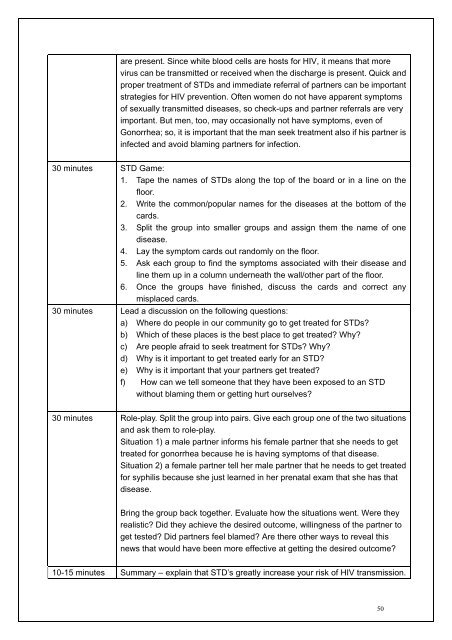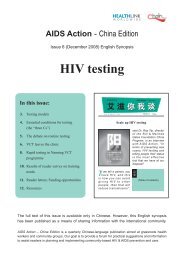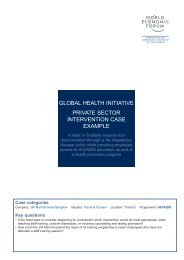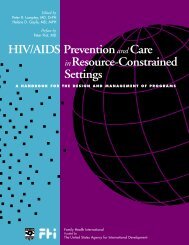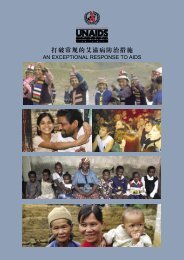What is HIV and AIDS?
What is HIV and AIDS?
What is HIV and AIDS?
You also want an ePaper? Increase the reach of your titles
YUMPU automatically turns print PDFs into web optimized ePapers that Google loves.
are present. Since white blood cells are hosts for <strong>HIV</strong>, it means that more<br />
virus can be transmitted or received when the d<strong>is</strong>charge <strong>is</strong> present. Quick <strong>and</strong><br />
proper treatment of STDs <strong>and</strong> immediate referral of partners can be important<br />
strategies for <strong>HIV</strong> prevention. Often women do not have apparent symptoms<br />
of sexually transmitted d<strong>is</strong>eases, so check-ups <strong>and</strong> partner referrals are very<br />
important. But men, too, may occasionally not have symptoms, even of<br />
Gonorrhea; so, it <strong>is</strong> important that the man seek treatment also if h<strong>is</strong> partner <strong>is</strong><br />
infected <strong>and</strong> avoid blaming partners for infection.<br />
30 minutes STD Game:<br />
1. Tape the names of STDs along the top of the board or in a line on the<br />
floor.<br />
2. Write the common/popular names for the d<strong>is</strong>eases at the bottom of the<br />
cards.<br />
3. Split the group into smaller groups <strong>and</strong> assign them the name of one<br />
d<strong>is</strong>ease.<br />
4. Lay the symptom cards out r<strong>and</strong>omly on the floor.<br />
5. Ask each group to find the symptoms associated with their d<strong>is</strong>ease <strong>and</strong><br />
line them up in a column underneath the wall/other part of the floor.<br />
6. Once the groups have fin<strong>is</strong>hed, d<strong>is</strong>cuss the cards <strong>and</strong> correct any<br />
m<strong>is</strong>placed cards.<br />
30 minutes Lead a d<strong>is</strong>cussion on the following questions:<br />
a) Where do people in our community go to get treated for STDs?<br />
b) Which of these places <strong>is</strong> the best place to get treated? Why?<br />
c) Are people afraid to seek treatment for STDs? Why?<br />
d) Why <strong>is</strong> it important to get treated early for an STD?<br />
e) Why <strong>is</strong> it important that your partners get treated?<br />
f) How can we tell someone that they have been exposed to an STD<br />
without blaming them or getting hurt ourselves?<br />
30 minutes Role-play. Split the group into pairs. Give each group one of the two situations<br />
<strong>and</strong> ask them to role-play.<br />
Situation 1) a male partner informs h<strong>is</strong> female partner that she needs to get<br />
treated for gonorrhea because he <strong>is</strong> having symptoms of that d<strong>is</strong>ease.<br />
Situation 2) a female partner tell her male partner that he needs to get treated<br />
for syphil<strong>is</strong> because she just learned in her prenatal exam that she has that<br />
d<strong>is</strong>ease.<br />
Bring the group back together. Evaluate how the situations went. Were they<br />
real<strong>is</strong>tic? Did they achieve the desired outcome, willingness of the partner to<br />
get tested? Did partners feel blamed? Are there other ways to reveal th<strong>is</strong><br />
news that would have been more effective at getting the desired outcome?<br />
10-15 minutes Summary – explain that STD’s greatly increase your r<strong>is</strong>k of <strong>HIV</strong> transm<strong>is</strong>sion.<br />
50


